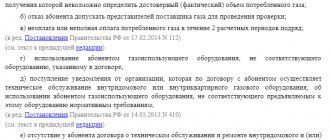Ruble punishment
First of all, in case of late payment of housing and communal services, residents will face an increase in debt due to the accrual of penalties.
But to do this, you must not pay your bills for at least 30 days - that is, the penalty is accrued from the 31st day. By law, the fine is limited to 1/300 of the refinancing rate for each day of delay. The refinancing rate is equal to the key rate and is, as of December 15, 2021, 7.75%. If the debtor continues not to pay, then after three months penalties are already accrued in the amount of 1/130 of the refinancing rate. For clarity: let’s imagine that your utility bill is 2.5 thousand rubles a month, you haven’t paid for two months, then to pay off the debt you will need to pay not 5 thousand, but 23 rubles more. In case of non-payment within six months, penalties will increase to 300 rubles.
Debt collection in court
Disconnection is not the worst consequence for non-payment of utility services. Even if the person is disconnected, he will be obliged to pay the supplier the entire amount of the debt along with penalties. For this purpose, the company will go to court. Such cases are considered by order. The court issues a court order based on the receipts, settlement documents provided by the collector, and the response of the second party, which indicates the reason for the delay. The parties are not summoned to court. The decision is made within 5 working days. The applicant's demands are satisfied if the arguments stated by the debtor are not serious. After the judicial act has acquired legal force, it is sent to the executors. And then, underpayment of housing and communal services will lead to serious results.
The company can also file a lawsuit to evict the debtor from a residential building or apartment. In such a situation, the judge rarely grants the applicant's claims. Since such measures would lead to a sharp increase in the number of homeless people. However, this does not mean that the debtor will go unpunished. The court will either subject the debtor to another type of punishment or give the debtor time to fulfill the obligation.
Written warnings
In parallel with the process of applying penalties, the debtor will receive letters from the management company warning about the possible transfer of the case to court. “The procedure for collecting debts for housing and communal services in general is no different from collecting any other debts. First, the management company or resource supplying organization sends claims demanding repayment of the debt that has arisen, along with calculations and deadlines. If the consumer does not repay the debt, the process of judicial collection of the debt for utilities will begin,” says Marat Amanliev, lawyer at the Trunov, Aivar and Partners bar association.
It is possible that a list of debtors will be posted at the entrance to make them “blush” in front of their neighbors. There is no legislative prohibition in this regard, as such. “The main thing here is to comply with the provisions on personal data. Do not indicate last names, first names, patronymics or whether the apartment belongs to a specific person. It is enough to indicate a list of apartment numbers and the corresponding debt. In this context, it is quite difficult to talk about violation of the law,” notes Marat Amanliev.
But most likely there will be no calls from the collector. According to the lawyer, today the practice of transferring debt to debt collectors has not yet been established, but he admits that in the future collection agencies will occupy this niche of working with debtors.
As Elena Dokuchaeva, president of the Sequoia Credit Consolidation collection agency, explained, most state-owned housing and communal services companies rarely turn to collection agencies because the market is still very young; the first cooperation with collectors was recorded here in 2010. In addition, with the average amount of debt for housing and communal services amounting to about 45 thousand rubles, labor costs for collection are high.
From whom should you demand repayment of debts for utility services?
If a debt arises, payment can be demanded from all owners, tenants and those registered jointly and severally.
Please note: in accordance with clause 29 of the Resolution of the Plenum of the Russian Armed Forces No. 22 of June 27, 2021, debts for utility services (with the exception of expense items for the maintenance of residential premises and major repairs) can be recovered from all owners and registered jointly. Each of them can be put forward a separate demand for repayment of the existing debt in full (in full).
When there is a change in the owner (tenant, tenant) of the property, debt on utility bills can be collected from both the new and the previous owner. The previous owner has obligations to pay all debts to housing and communal services, with the exception of debt for major repairs - this debt, in accordance with clause 3 of Art. 158 Housing Code of the Russian Federation, passes to the new owner.
Please note: the debt is registered on specific people with whom management companies sign an agreement, and not on real estate objects.
The only exceptions are inherited apartments (the heir is obliged to pay the entire utility debt).
Restrictive actions
If the debtor manages to “turn a blind eye” to penalties and letters, and even calls, then the next method of influence definitely cannot be ignored: turning off electricity, water and gas in the apartment.
“For example, if we talk about gas, then in the literal sense of the word the pipe entering the stove can be cut and a plug welded on. After full payment of the debt, the consumer will have to apply to restore the gas supply and pay for the corresponding technical work. However, gas service workers may encounter a problem here. They cannot enter a person’s home. According to the Constitution of the Russian Federation, the home is inviolable; third parties can enter it in exceptional cases; law enforcement agencies have this right. Therefore, the issue of turning off gas in an apartment building is a big question,” says Marat Amanliev.
Another point is if we are not talking about an apartment, but about a house connected to the main gas pipeline. Here, according to Amanliev, everything is much simpler. The management company’s employees do not need to penetrate anywhere; it is enough to cut off the tie-in that goes from the common gas pipeline to the house. “With light, everything is also quite simple. Electricians come and cut off the wires in the electrical panel, which is publicly accessible on the landing or in the vestibule on the floor,” the lawyer argues.
In some regions, debtors are still disconnected from the sewerage system by installing plugs on the sewer pipe. But this is a controversial issue. On the one hand, the law does not prohibit this. But on the other hand, such a restriction can be interpreted as a violation of the requirements for the suitability of an apartment for habitation, which public utilities should not allow according to the rules for the provision of public services.
Of course, utility companies will not apply restrictive measures to everyone. “According to the law, such a drastic method can be resorted to after two months of missing payments, but in practice, companies try to use this measure of influence as a last resort when it is not possible to come to an agreement with the debtor,” notes Elena Dokuchaeva and adds that there is another important nuance - disconnection resources should not affect bona fide payers. Neighbors should not suffer from this, both in the house as a whole and in the apartment - if we are talking about a communal apartment.
By the way, they cannot turn off the heating in the apartment; in this regard, debtors are protected by the rules for organizing heat supply in Russia, approved by a decree of the Government of the Russian Federation in 2012.
The expert told how they will extract debts for housing and communal services from Russians
— According to a Rosstat study, the average Russian family pays 4.8 thousand rubles for housing and communal services, which is about 10% more than a year earlier. It turns out that the increase in prices for utilities exceeds official inflation by 2.5–3 times. What is the reason for this imbalance?
— Well, the results of the Rosstat study are very similar to the truth. Various industry experts have already cited similar figures. Indeed, tariff growth exceeds the inflation rate.
The only way to find out how legitimate housing and communal services tariffs are is to conduct an independent audit of them. I have a suspicion that tariffs do not pass such a check - they are simply taken out of thin air, and then this incomprehensible figure is adjusted for inflation. And this principle is used year after year.
In fact, you first need to understand the basis by which the tariff itself is calculated. For example, how much is spent on some updates, digitalization or some other things - all this will be included in the tariff, and then it will be justified.
— Many consumers, judging by the requests from MK readers, still have no idea on what principle housing and communal services tariffs are set in Russia. So where do they come from anyway?
- Let's figure it out. When we receive a payment slip, housing and communal services are listed there. We can check housing services that are designated by the letter “F”. The amount is written out by the management company, and people see what expenses it had: checking elevators, smoke extractors, maintenance of entrances, routine repairs... If we talk specifically about the letter “K” - utilities, then it is impossible to carry out an inspection. This is a big secret that ordinary residents are not privy to. The tariffs have never been audited, and what they consist of is unknown. When we try to organize their independent audit, we are faced with enormous opposition from both legislative and executive bodies.
- How to deal with this?
- No way. We have contacted various local authorities many times: “Let’s audit the tariffs.” We have never received a positive response to the proposal anywhere. Management companies also say that they have nothing to do with this: they, they say, have tariffs that are approved by the legislative authorities (each region has its own). How they are installed is, again, a big mystery that I really want to unravel. But without an audit this is impossible.
— This year, many Russians expected the authorities to abandon the traditional July indexation of utility tariffs and “freeze” them due to falling incomes. However, this never happened: tariffs were raised by an average of 4% across Russia. How justified was this decision?
— I would very much like tariffs not to increase from July 1st. This year, the pandemic adjusted everything for us, and the next increase for many residents of the country who lost their income became a real nightmare. Meanwhile, experience shows: when authorities reduce the required payments, including for housing and communal services, residents pay more willingly. When payments for major repairs for 3 months were reduced, residents paid more out of gratitude. They see that they are taken care of and reciprocate.
“At the same time, against the backdrop of the pandemic, payment collection is falling. There is evidence that a third of Russians stopped paying for housing and communal services during the pandemic. It is clear that income has fallen, but there is another reason: a moratorium has been imposed on fines for non-payment until the end of this year. What will happen to the debt when the moratorium is lifted? How much debt can tenants incur?
— The moratorium was a very correct decision. There are already about 4 million unemployed in Russia, and by the end of the year, according to the most optimistic forecasts, it is planned that their number will grow to 5 million, and according to realistic forecasts, to 7 million. Now people are losing their jobs even more often than during the period of self-isolation, and finding a new one is very difficult. Therefore, the population is accumulating debts for housing and communal services: many conscientious payers, who previously regularly paid for consumed resources, understand that now they cannot afford it.
Unfortunately, a mechanism has not yet been developed for how the debt problem will be solved after January 1, 2021. Currently there are no clear regulations from the Ministry of Construction. The authorities must explain how penalties, fines, and the shutdown of resources for non-payment will be returned. In these conditions, we can only advise one thing: those residents who have already accumulated large debts should not be shy, rather run for subsidies for housing and communal services and apply for an installment plan from the management company. This was not stated in the government resolution on the moratorium on disconnections, but the Ministry of Construction emphasized several times that those who cannot pay need to negotiate an installment plan, otherwise the management company will be able to take its own measures.
— On this occasion, a question from a reader: “During the pandemic, debt has accumulated. Now I’m at the dacha, and there’s no way to deal with this yet. When should you pay off your debt to avoid problems? I'm interested in step-by-step instructions."
— If you are currently in your dacha, then you need to contact your management company as soon as possible, because it is probably already listing your apartment on the “black list” of debtors. Unfortunately, management companies still have every right to do this, but they cannot turn off resources. I am very afraid that management companies, when they are given carte blanche and allowed to cut off debtors from resources, will begin mass shutdowns of gas and heating... In the cold season (and the government moratorium expires on January 1), this will simply become a mockery. But they will try to get out of debt by any means necessary.
Meanwhile, in some regions, huge amounts of debt have accumulated: at the very least, the drop in payments is 30%, and in some places it reaches 70-80% - this is a catastrophic situation. Now we cannot do without government help. First of all, resource providers need budget support, namely targeted subsidies. Everything must be decided on a case by case basis.
As for citizens, the more requests for subsidies, the better. There is no need to sit and wait for your personal income to increase on its own, and you will again be able to pay for utilities. The government must understand that it is very difficult to help everyone individually: there is a chance of drowning in numerous requests. It is easier to organize a massive distribution of subsidies - for example, the state temporarily takes on 30% or 50% of the bill for housing and communal services. If people are given a subsidy, they will pay more willingly - this works on a psychological level.
“Nowadays, not everyone receives such support from the state. I quote the reader’s letter again: “During the pandemic, debts have accumulated, and there is no way to pay the bills yet. There is work, but there is not enough money to pay. Now I am included in this list of “shame and disgrace to debtors,” I feel like a parasite, like before in the USSR.” Is it even legal to publicly pillory defaulters?
— It’s unpleasant to receive such a paper, and even more so to see your apartment and name on the entrance door, but in order not to be included in the list of debtors, I recommend agreeing with the management company on an installment plan, and not hiding from it. Management companies cannot, while the moratorium is in effect, cut off utilities to debtors, but no one forbids them from calling them publicly and saying what debts people have. True, in some regions resources are still turned off. This is absolutely illegal, and in such cases you must contact the prosecutor's office and the housing inspection.
— The heating season is coming. Voices are already being heard that management companies may not have enough money for all the measures to prepare houses for the cold, since there are more defaulters. Will it be possible to prepare all the houses for the heating season on time?
— In Russia there have always been difficulties with preparing houses for winter. In such cases, the management companies wrote letters of guarantee, and the local administration took them on bail. Some representatives of houses and municipal deputies signed in advance a passport of the readiness of a particular house for the cold. I have always been against this practice: it’s signed, off your shoulders, and no one else does anything.
Now the situation is really difficult, and the preparation of buildings for winter is delayed. Here, again, we cannot do without the help of the state. Management companies are having a hard time: if payments have fallen by an average of 50%, management companies simply cannot pay their subcontractors.
— How will this affect consumers? Can residents be left without heat during the cold season?
“We can only hope for the best—that there will be no emergency situations.” Now monitoring of accidents in the housing and communal services sector has become better, but preparing houses for winter should not depend on hope for chance. Where for some reason they do not have time to prepare the house, state support is needed. Federal subsidies must be provided. There is no other way out yet. Meanwhile, residents themselves must be active and monitor the situation: in winter, at the height of the cold, it will be too late.
— How, exactly, can we track it ourselves?
— First of all, this should be done by the council of the apartment building, or the chairman of the housing cooperative, or the HOA. Residents have the right to contact and ask whether the house was completed for winter. You can also find out from the Criminal Code how the preparation is going, whether all documents have been signed by municipal deputies. This is necessary to know who is responsible. Citizens may have doubts that everything was done correctly: what if the signatures were forged? Such situations are not uncommon, and we need to deal with it. In those homes where residents do not let the situation take its course, one can hope that the homes will be well prepared and welcomed for winter.
— From July 1, as you know, Russians were required to install “smart” electricity meters. Energy companies will have to pay for this event. Will resource providers purchase new metering devices using borrowed funds? Is it possible that residents will have to pay off their loans, and all costs will be included in the tariff?
- Indeed, there is such a risk. According to the law, meters are installed not at the expense of residents, but at the expense of management companies and resource supply organizations. I want to warn you: if you are offered to install meters for money, then under no circumstances pay, do not let scammers into your apartment, and immediately report the incident to the management company. Residents do not have to pay anything for this.
If we talk about what will happen next with the costs of “smart” meters, then they will most likely be included in the tariff and will ultimately fall on the shoulders of consumers. Those who previously did not have meters and who paid the average tariff will benefit here. And those who already had multiphase meters and are already accustomed to turning on the washing machine or dishwasher at night, when the tariff is quite low, will lose greatly. For such consumers, the new requirement will pose an additional financial burden.
— It turns out that energy companies will divide their costs among absolutely all residents - regardless of whether the payer has a “smart” meter installed or not, the amount will be “spread out” and included in the tariff?
- Unfortunately yes. They don't need a new meter, but they will still have to pay more. I urge the Ministry of Construction and Housing and Communal Services to solve this problem so that those who already had multiphase meters will have their electricity costs reduced.
— How much can the electricity tariff increase?
— If it is “spread out” over several months, then the amount will increase by no more than 0.5%. But this is still money that is tangible for many low-income families.
— Readers complain about the decline in the quality of cleaning in the house: “They used to wash conscientiously, but now they fiddle with a rag on the staircase for a couple of minutes, and that’s all. When we ask you to wash it more thoroughly or remove the posted advertisements, they say: 200 rubles for this.” Why has the quality of services decreased? Where to turn, how to fight?
— According to recent opinion polls, more than 80% of residents are dissatisfied with their management companies. The rest of the residents, I'm afraid, were simply not asked. Indeed, management companies are trying to save a lot on their work and their expenses, which leads to a decrease in the quality of services. During the pandemic, management companies were required to carry out disinfection with special means, and at their own expense. This put a serious dent in their budget.
But all the same, residents must check their management companies: ask to submit their reports for the previous year. If the documents say that the company carried out monthly inspections of elevators, smoke extractors, etc., but in fact this was not the case, then the costs were included in the payment incorrectly. You can demand compensation from the Criminal Code or go to the housing inspection, the prosecutor and the court.
— Because of the coronavirus, most migrant janitors and cleaners left for their homeland. Will there be a staffing problem? Will native Russians go to work in housing and communal services?
- In any case, you will have to hire employees. It would be right if companies start hiring local residents, because many have lost their jobs and are willing to accept any salary. When there is nothing to feed the family, pay bills, or buy food, then people have no time for whims. I think that management companies should hire local residents to give them the opportunity to earn money. Most likely, management companies paid less to staff from other countries; this was beneficial to them. Now we need to change this policy.
— Let’s summarize: what awaits the industry by the end of the year - taking into account the July indexation, the increase in tariffs due to the transition to “smart” electricity meters, the imminent lifting of the moratorium on the assessment of fines for non-payment of utility bills, as well as falling incomes and rising unemployment? Are resource workers and households facing a financial crisis?
“Unfortunately, without government help, the housing and communal services industry may collapse. Residents accumulate large debts, many lose their jobs and find themselves in dire straits. Now is the time for the state to help people. Resource providers and management companies should be given targeted subsidies, and citizens - massive ones. Before this happens, consumers themselves need to apply for targeted subsidies from the MFC as quickly as possible and negotiate installment plans with the management company in order to avoid shutdowns of their apartments and local financial crises in family budgets.
Seizure of property
The next step is trial. After this, bailiffs come into play and can prohibit the debtor from leaving the country, temporarily deprive him of his driver’s license, oblige his employer to withhold from his salary and transfer up to 50% of his income to pay off the debt, seize and put up for auction property, including an apartment. . “But an apartment can be sold at auction for housing and communal services debts only if the owner has other suitable housing. True, this is also not easy; the principle of proportionality applies here. If the debt is 50 thousand, not a single bailiff will arrest and sell at auction an apartment worth 8–9 million. And if the debt is already astronomical (1.5–2 million), then the owner has something to fear,” warns Marat Amanliev.
A real nightmare can await debtors who live in an apartment under a social tenancy agreement and have not paid utility bills for more than six months. They can be evicted from the apartment, given in exchange at least 6 square meters in the dormitory. But the decision to evict is made only by a judge. If the debt arose for a good reason—loss of job, illness, etc.—then the court will refuse to use such a measure.
At what amount of utility debts do housing and communal services go to court?
The amount owed is a non-payment that meets a number of criteria. They are listed in paragraph 118 of the Rules , which were approved by Resolution No. 354 . Main criteria:
- The payment was not made within 2 months from the date of its accrual according to the standards for the consumption of housing and communal services.
- An agreement on installment payment of debts was not concluded with the debtor.
- The terms of the debt installment agreement were violated.
To calculate the amount of debt, resource consumption standards are taken into account. They are approved by local authorities. Therefore they vary from region to region. Also, the amount of debt depends on the type of housing and communal services and the pricing policy of the resource supplying organization. The consumer is recognized as a debtor in the case when his non-payment of the utility bill exceeds the double tariff.
Debt can be collected from a tenant of an apartment or private house in court or out of court (peacefully). If the debt does not exceed 500,000 rubles, then the resource supply company or management company can appeal to the magistrate at the defendant’s place of residence. After examining the case, an order will be issued to repay the debt within a specified period. If the debtor objects, then legal proceedings will be initiated.
If the amount of debt is above 500,000 rubles, then legal proceedings are opened against the debtor.










